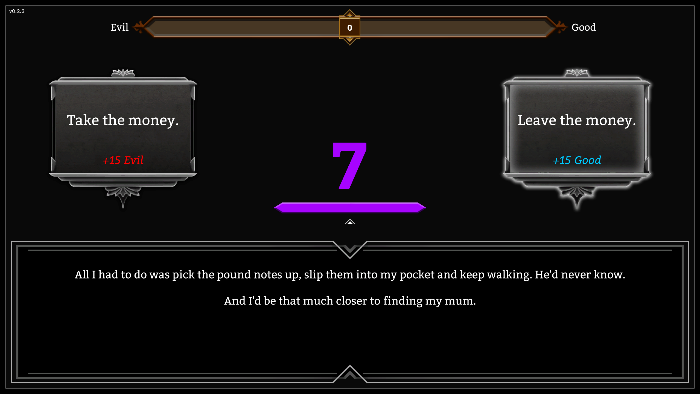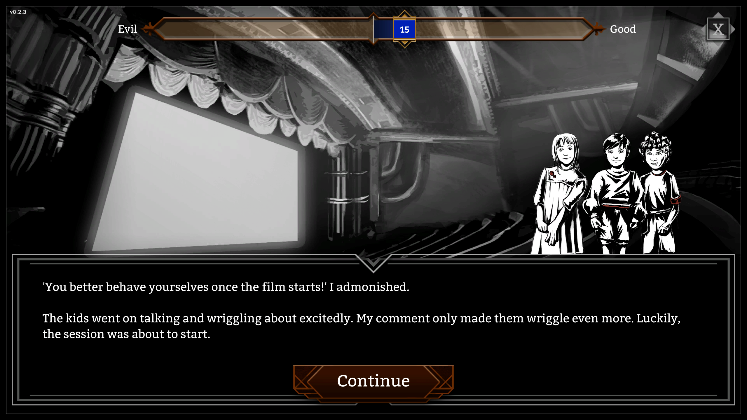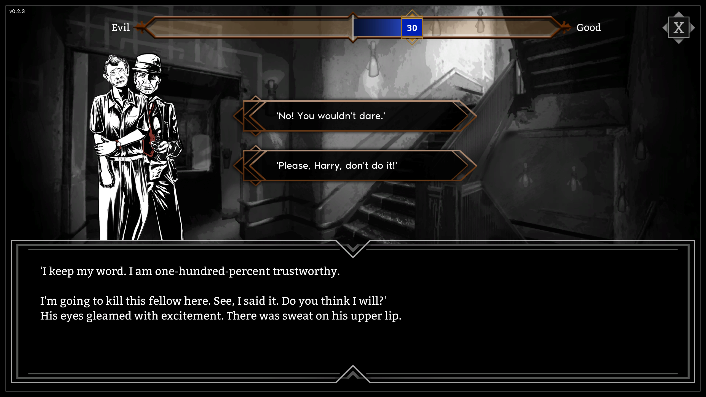Researchers have built their own computer game to test the impact of meters that show players the morality of their decisions.
Two papers published by Macquarie University researchers reveal that most of us ignore the meter when a moral choice is clear, but we use it when the choice is more morally ambiguous. And some of us, about ten per cent, will do anything to win.
You are playing The Great Fire, a narrative computer game. It’s all about Frankie, an usher in a cinema in regional Australia in the 1940s, who is confronted by a murderous psychopath.
Along the way, players have to make choices which affect the progress and outcome of the game. Some are simple black and white decisions, such as kicking a dog or not, but others are what are called “trolley problems”, whether you will kill or harm someone if it saves others, for instance.
Each choice is labelled with a score of good or evil, and your total morality registers on a meter at the top of the screen throughout the game. But the moral impact of a choice is not always clear, if you go by its score. It can even be counterintuitive. Do you rob a homeless person of money that could assist you? What happens if the moral score insists this is a good thing?
“Our hypothesis was that under that circumstance, players might choose to steal,” says Dr Malcolm Ryan, course director of the Games Design and Development Program in School of Computing at Macquarie University. “But we were relieved to find telling people that stealing money is good doesn’t change their response… Although there will always be about 10 per cent who will choose to do it anyway.”

To study such issues is exactly why he developed The Great Fire with his long-term research partner Professor Paul Formosa, who is co-director of the Macquarie University Ethics & Agency Research Centre and Head of the Department of Philosophy. They were assisted by colleagues such as writer Dr Jane Messer and cognitive psychologist Dr Stephanie Howarth to build a fully functional computer game of which they own the course code, allowing them to change things at will.
“Morality meters, that indicate how good or evil your avatar is, have been around computer games since 1985 when Richard Garriott pioneered the idea in Ultima IV." Dr Ryan says. But until now there has been no empirical data on which to base discussion of their impact on the attractiveness of games, or their effect on players.

Dr Ryan sees this work as important for several reasons. “For me, the entertainment value of games is primary. I want to improve them as a designer, not just because they are fun, but because I want to see them become like more mature works of art and literature, able to deal with serious topics of morality.”
This has application to moral education and awareness, he says. “Games provide a way of simulating different moral scenarios and asking what is the right thing to do.”
The research involving The Great Fire has already generated two papers. The first, published in the journal Games and Culture in January last year, was qualitative, exploring the feelings of players and their responses to the morality meter. It showed a difference between players who made choices simply to maximise their morality score, and others who viewed the meter as some sort of moral guide.
A second paper published earlier this year in the Computers in Human Behaviour provides the first quantitative data on morality meters. The results show that the meter is generally ignored when a moral choice is straightforward, but it can influence decisions when the choice is more morally ambiguous.

The team has already started on further work, such as a study on the impact, in morally ambiguous situations, of knowing what others think. If we know how a majority will act, do we tend to go along with the crowd?
In addition, the Department of Computing is currently fitting out a Games User Research Lab where biometric measures, such as skin conductance and eye blink rate can be taken, while experimental subjects are engrossed in computer games. “Blink rate, for instance, can be an indicator of how deeply you are thinking about something,” says Malcolm Ryan. “These biometrics will give us a snapshot of the moment-by-moment experience of players.”
“There is a lot of interest worldwide in this area,” he says, “so I will be running a workshop at the Digital Games Research Association conference in June in Seville, Spain.” The session will also be available online. And the researchers are already talking with a local games company which is developing a game based around ethical decisions.
Media contact: Annette Adamsas, Communications Manager, Faculties
[email protected], 0417 489 903
Abstracts
Morality Meters and Their Impacts on Moral Choices in Videogames: A Qualitative Study
https://doi.org/10.1177/15554120211017040
Morality meters are a commonly used mechanic in many ethically notable video games. However, there have been several theoretical critiques of such meters, including that people can find them alienating, they can instrumentalise morality, and they reduce morality to a binary of good and evil with no room for complexity. While there has been much theoretical discussion of these issues, there has been far less empirical investigation. We address this gap through a qualitative study that involved participants playing a custom-built visual novel game (The Great Fire) with different intuitive and counter-intuitive morality meter settings.
Overall, we found that players’ attitudes towards the morality meter in this game was complex, context sensitive and variable throughout gameplay and that the intuitiveness of the meter encouraged participants to treat the meter more ‘as a moral guide’ that prompts reflection and less ‘as a score’ to be engaged with reactively.
1 Department of Philosophy, Macquarie University, North Ryde, Australia
2 Department of Computing, Macquarie University, North Ryde, Australia
3 Department of Cognitive Science, Macquarie University, North Ryde, Australia
4 Macquarie University, North Ryde, Australia
5 Department of Computing, Macquarie University, North Ryde, Australia
The effect of morality meters on ethical decision making in video games: A quantitative study
https://doi.org/10.1016/j.chb.2022.107623
The “morality meter” is a popular mechanic in games involving ethical decision making used to give players moral feedback about their actions. However, this function is controversial, with some theorists claiming such meters reduce complex ethical problems to an artificial binary of ‘Good’ vs ‘Evil’ and encourage an instrumental approach to moral decision making. In this paper, we set out to empirically evaluate the effect of adding a morality meter to a simple visual-novel game involving a variety of ethical choices. Three different versions of the meter were tested and compared against a meter-free version of the game. Results show that the meter is generally ignored when the moral choice is straightforward, however it can influence decisions when the choice is morally ambiguous. The strength of the effect depends on the apparent trustworthiness of the meter. A meter which advocates intuitively immoral responses as Good has less influence than one that broadly aligns with the player's expected moral compass.
Malcolm Ryan a, Mitchell McEwan a, Paul Formosa b, Jane Messer c, Stephanie Howarth d
a Department of Computing, Macquarie University, Australia
b Department of Philosophy, Macquarie University, Australia
c Department of English, Macquarie University, Australia
d Department of Cognitive Science, Macquarie University.
Contact details:
Media contact: Annette Adamsas, Communications Manager, Faculties
[email protected], 0417 489 903


